Sunscreen
Protect your skin with our sunscreen collection, designed to shield against harmful UV rays while keeping your skin moisturized and radiant.
Showing 1–12 of 97 results
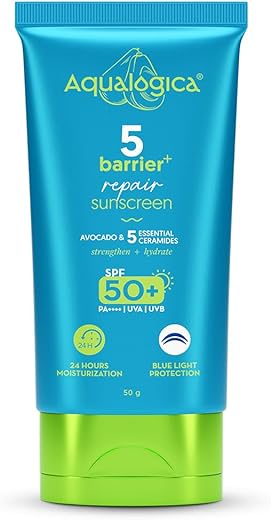
Aqualogica 5 Barrier+ Repair Sunscreen 50g

Aqualogica Detan Sunscreen | Detan+ Dewy 50g
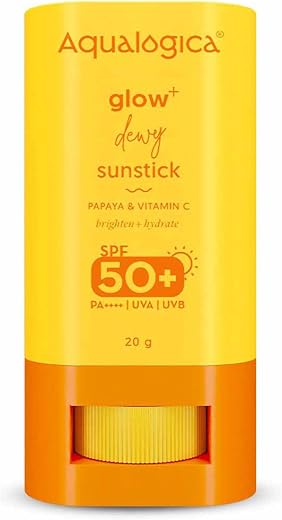
Aqualogica Glow+ Dewy Sunstick With Papaya & Vitamin C 20g
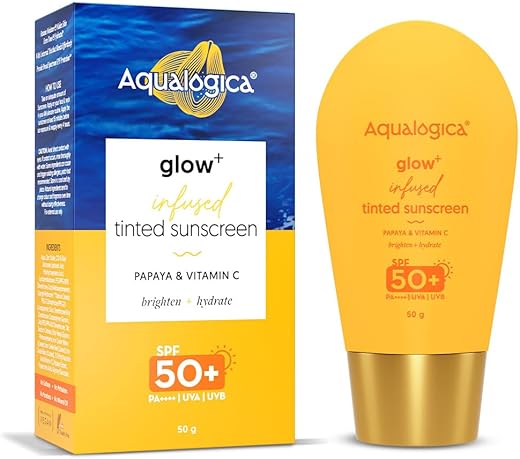
Aqualogica Glow+ Infused Tinted Sunscreen 50g
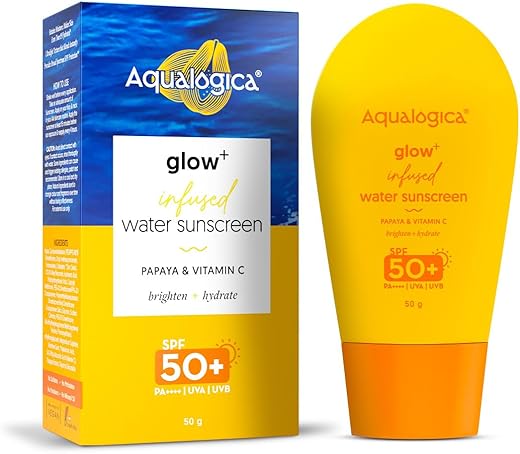
Aqualogica Glow+ Infused Water Sunscreen 50g

Aqualogica Sunscreen for Oily Skin | Illuminate+ Dewy 50g

Aqualogica Sunscreen Green | Hydrate+ Dewy 50g

Aqualogica Sunscreen SPF 50 | Glow+ Dewy 50g

Aqualogica Sunscreen Watermelon | Radiance+ Dewy – 50g
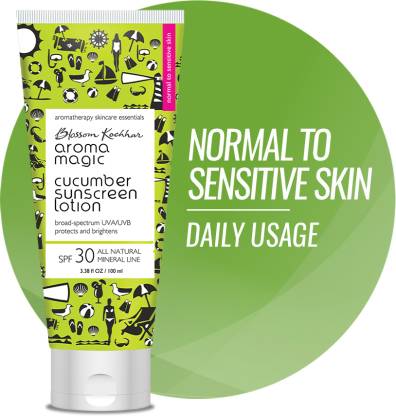
Aroma Magic Sunscreen – SPF 30 PA++ Cucumber Sunscreen Lotion 50 ml

Ayuga Sunscreen – SPF 50 PA++++ Kashmiri Saffron with Jasmine for Blue light & UV Protection (50 g)

Bioderma Photoderm Tinted Sunscreen | Normal To Dry Sensitive Skin, 40ml
FAQs
1. What is sunscreen, and why is it important?
Sunscreen is a topical product that helps protect your skin from the sun’s ultraviolet (UV) rays. It prevents sunburn, premature aging, and reduces the risk of skin cancer. Daily use of sunscreen is essential for maintaining healthy skin.
2. What’s the difference between UVA and UVB rays?
- UVA Rays: These penetrate deep into the skin and cause premature aging, wrinkles, and dark spots. They can also pass through windows and clouds.
- UVB Rays: These affect the outer layer of the skin and cause sunburn. They play a key role in the development of skin cancer.
A good sunscreen protects against both types of rays.
3. What does SPF mean?
SPF (Sun Protection Factor) measures how well a sunscreen protects against UVB rays, which cause sunburn. For example, SPF 30 blocks about 97% of UVB rays, while SPF 50 blocks about 98%. No sunscreen can block 100% of UV rays.
4. What is broad spectrum sunscreen?
Broad spectrum sunscreen protects against both UVA and UVB rays. UVA rays cause long-term skin damage, while UVB rays cause sunburn. Using a broad spectrum sunscreen ensures comprehensive protection.
5. How much sunscreen should I apply?
Adults should use about one ounce (a shot glass full) of sunscreen to cover their entire body. For the face, use about a nickel-sized amount. Applying too little reduces the effectiveness of the sunscreen.
6. How often should I reapply sunscreen?
Reapply sunscreen every two hours, or immediately after swimming, sweating, or towel drying. Even water-resistant sunscreens lose their effectiveness over time.
7. Can I use sunscreen on my face?
Yes! Look for sunscreens specifically formulated for the face, as they are often lightweight and non-comedogenic (won’t clog pores). Daily use of facial sunscreen helps prevent premature aging and dark spots.
8. What’s the difference between chemical and mineral sunscreens?
- Chemical Sunscreens: These absorb UV rays and convert them into heat. They’re lightweight and easy to apply but may irritate sensitive skin.
- Mineral Sunscreens: These contain zinc oxide or titanium dioxide, which sit on the skin’s surface and physically block UV rays. They’re gentler and ideal for sensitive skin but can leave a white cast.
9. Is sunscreen safe for kids?
Yes, but for children under six months, consult a pediatrician before using sunscreen. For older kids, choose a broad spectrum sunscreen with SPF 30 or higher, and opt for mineral-based formulas for sensitive skin.
10. Can I use sunscreen if I have dark skin?
Absolutely. While darker skin has more natural melanin, which provides some protection against UV rays, it’s still susceptible to damage. Sunscreen helps prevent hyperpigmentation, dark spots, and skin cancer in all skin tones.
11. Do I need sunscreen on cloudy days?
Yes. Up to 80% of the sun’s UV rays can penetrate clouds, so you still need protection even when it’s overcast. UVA rays can also pass through windows, so wearing sunscreen indoors is a good idea if you’re near a window.
12. Can I wear makeup over sunscreen?
Yes! Let the sunscreen absorb into your skin for a few minutes before applying makeup. You can also use makeup products with SPF, but they shouldn’t replace your regular sunscreen.
13. Does sunscreen expire?
Yes. Most sunscreens have a shelf life of about three years. Check the expiration date on the bottle, and discard any sunscreen that has changed in color, consistency, or smell.
14. Is sunscreen enough for all-day protection?
No. While sunscreen is essential, it’s not a one-time application. Reapply every two hours, and pair it with other sun protection measures like wearing hats, sunglasses, and seeking shade during peak sun hours (10 a.m. to 4 p.m.).
15. Can sunscreen prevent tanning?
Sunscreen reduces the risk of tanning by blocking UVA and UVB rays, but it doesn’t completely prevent it. If you want to avoid tanning, reapply sunscreen frequently and limit sun exposure.
16. What’s the best sunscreen for outdoor activities?
For outdoor activities like hiking, swimming, or sports, choose a broad spectrum sunscreen with SPF 30 or higher and water-resistant properties. Reapply frequently, especially after sweating or swimming.
17. Can I use sunscreen if I have acne-prone skin?
Yes. Look for non-comedogenic sunscreens that won’t clog pores. Gel-based or lightweight formulas are often better for acne-prone skin.
18. Are spray sunscreens effective?
Spray sunscreens can be effective if applied generously and evenly. However, they can be harder to measure, and inhaling the spray can be harmful. Use sprays in well-ventilated areas and avoid applying them directly to the face.
19. Can I use sunscreen with other skincare products?
Yes. Apply sunscreen as the final step in your skincare routine, after moisturizer and before makeup. Allow each product to absorb fully before applying the next.
20. Is sunscreen necessary in winter?
Yes. UV rays are present year-round, and snow can reflect up to 80% of UV rays, increasing your exposure. Wear sunscreen daily, even in winter.
Sunscreen: Your Shield Against Sun Damage
Sunscreen is a vital product for skin protection. It helps prevent sunburn and reduces the risk of skin cancer. Using sunscreen daily is essential for maintaining skin health.
Why Use Sunscreen?
Using sunscreen daily offers many benefits. It helps prevent skin damage. Sun exposure can lead to wrinkles, dark spots, and other skin issues. Regular sunscreen use can keep the skin youthful and healthy.
Sunscreen also reduces the risk of skin cancer. The Skin Cancer Foundation states that regular use of SPF 15 or higher sunscreen can lower skin cancer rates. This is especially important for people who spend time outdoors.
How to Choose the Right Sunscreen
Choosing the right sunscreen is important for effective protection. Look for sunscreens labeled “broad-spectrum.” This means they defend against both UVA and UVB rays. Additionally, select a sunscreen with an SPF (Sun Protection Factor) of at least 30. Higher SPF values provide more protection.
Consider your skin type when choosing a sunscreen. If you have oily skin, look for oil-free or gel-based formulas. If your skin is dry, consider creams or lotions with added moisturizers. Sensitive skin may benefit from mineral-based sunscreens containing zinc oxide or titanium dioxide.
How to Apply Sunscreen
Applying sunscreen correctly ensures maximum protection. Here are some simple steps:
- Apply Early: Put on sunscreen at least 15 minutes before going outside. This gives it time to absorb into the skin.
- Use Enough: Use about one ounce (a shot glass full) for your entire body. Don’t forget areas like the ears, neck, and tops of feet.
- Reapply Often: Reapply every two hours, especially after swimming or sweating. Use a waterproof sunscreen if you plan to swim.
- Check the Expiration Date: Sunscreens can lose effectiveness over time. Always check the expiration date before applying.
Additional Sun Safety Tips
Sunscreen is just one part of sun safety. Wear protective clothing, such as hats and long sleeves, to shield your skin. Seek shade, especially during midday when the sun’s rays are strongest. Sunglasses also protect the eyes from UV damage.
Conclusion
Sunscreen is an important tool for skin health. Regular use protects against sunburn, premature aging, and skin cancer. Choose the right product, apply it correctly, and make sunscreen a part of your daily routine. Protect your skin and enjoy the sun safely.

